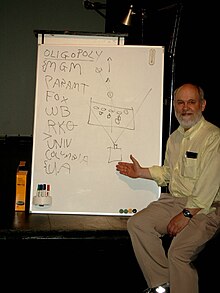David Bordwell
| David Bordwell | |
|---|---|

Bordwell lecturing on the economics of the film industry; his whiteboard diagram shows the oligopoly that existed in the US film industry during the Golden Age of Hollywood.
|
|
| Born |
July 23, 1947 New York, U.S. |
| Residence | Madison, Wisconsin, U.S. |
| Nationality | American |
| Occupation | Film historian, film theorist |
| Spouse(s) | Kristin Thompson |
| Website | http://www.davidbordwell.net |
David Bordwell (born July 23, 1947) is an American film theorist and film historian. Since receiving his PhD from the University of Iowa in 1974, he has written more than fifteen volumes on the subject of cinema including Narration in the Fiction Film (1985), Ozu and the Poetics of Cinema (1988), Making Meaning (1989), and On the History of Film Style (1997).
With his wife Kristin Thompson, Bordwell wrote the introductory textbooks Film Art (1979) and Film History (1994). With aesthetic philosopher Noël Carroll, Bordwell edited the anthology Post-Theory: Reconstructing Film Studies (1996), a polemic on the state of contemporary film theory. His largest work to date remains The Classical Hollywood Cinema: Film Style and Mode of Production to 1960 (1985), written in collaboration with Thompson and Janet Staiger. Several of his more influential articles on theory, narrative, and style were collected in Poetics of Cinema (2007), named in homage after the famous anthology of Russian formalist film theory Poetika Kino, edited by Boris Eikhenbaum in 1927.
Bordwell spent nearly the entirety of his career as a professor of film at the University of Wisconsin–Madison, where he is currently the Jacques Ledoux Professor of Film Studies, Emeritus in the Department of Communication Arts. Notable film theorists who wrote their dissertations under his advisement include Edward Branigan, Murray Smith, and Carl Plantinga. He and Thompson maintain the blog "Observations on film art" for their recent ruminations on cinema.
Drawing inspiration from earlier film theorists such as Noel Burch as well as from art historian Ernst Gombrich, Bordwell has contributed books and articles on classical film theory, the history of art cinema, classical and contemporary Hollywood cinema, and East Asian film style. However, his more influential and controversial works have dealt with cognitive film theory (Narration in the Fiction Film being one of the first volumes on this subject), historical poetics of film style, and critiques of contemporary film theory and analysis (Making Meaning and Post-Theory being his two major gestures on this subject).
...
Wikipedia
